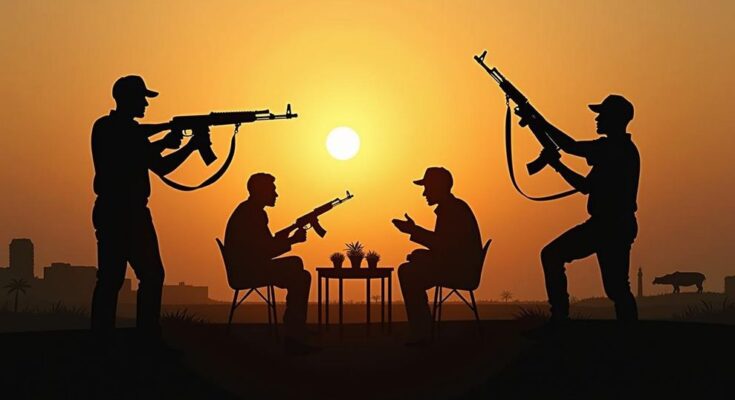U.S. officials are pressuring the UAE to halt weapon transfers to the RSF in Sudan, which is engaged in a civil war described by President Gen. Burhan as involving genocidal acts. Burhan has called out the RSF as a terrorist group, further emphasizing that over 26 million people face acute hunger and millions are displaced due to ongoing violence. International actors, including the U.S. and the EU, are urging an end to external support for the belligerents amid a worsening humanitarian crisis.
In a recent diplomatic engagement, American officials conveyed to Sudanese President Gen. Abdel Fattah al-Burhan their commitment to exerting pressure on the United Arab Emirates (UAE) to cease its military support to the Rapid Support Forces (RSF), a rebel group implicated in severe human rights violations amid Sudan’s ongoing civil conflict. Burhan articulated his concerns regarding the RSF’s actions and lamented the lack of effective international intervention during a press briefing in New York City. Burhan highlighted that this war, ongoing since April 2023, has precipitated a humanitarian catastrophe, with countless civilians, particularly women and children, suffering dire conditions. He characterized the RSF as a terrorist entity, calling for a formal designation of the group as such by the United Nations. Despite his appeal for assistance at the UN General Assembly, Burhan stressed the necessity of negotiating peace without preconditions, while asserting that his forces remain engaged in operations to reclaim territories held by the RSF. Internationally, the plight of Sudan has drawn pointed criticism and urgent calls for actions from global leaders. Humanitarian organizations continue to face significant challenges accessing the affected populations due to both the nature of the conflict and deliberate hindrances imposed by conflicting parties. Experts underscore the complicity of external actors, including the UAE’s continued support for the RSF, in exacerbating the violence and humanitarian crisis. As discussions unfold, the complex interplay of local power struggles and international involvement remains pivotal in shaping the future of Sudan and its efforts towards recovery and peace.
The ongoing conflict in Sudan has escalated into a devastating war primarily between the Sudanese Armed Forces (SAF) and the Rapid Support Forces (RSF). The RSF, formerly known as the Janjaweed, gained notoriety for their involvement in previous genocidal actions in Darfur. The current conflict erupted in April 2023, leading to what the United Nations has deemed one of the worst humanitarian crises globally. Millions of people are suffering from acute hunger, and many have been forced to flee their homes. The involvement of foreign powers, notably the UAE’s alleged support for the RSF, has compounded the situation, creating obstacles to achieving a united resolution for peace in Sudan. Humanitarian groups are struggling to provide aid due to conflict-related barriers and the politicization of assistance efforts.
The urgent calls for international intervention to halt the flow of arms to the RSF, as well as the broader efforts to resolve the humanitarian crisis in Sudan, illustrate the complex interplay of local and international dynamics at play. President Burhan’s appeals for support underscore the dire situation in his country and the growing recognition of the RSF as a destabilizing force. As the conflict persists, it remains critical for the global community to reevaluate its engagement strategies to facilitate meaningful aid and support for peace efforts in Sudan.
Original Source: www.passblue.com




